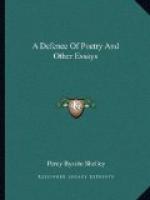The examination of this subject requires that it should be stript of all those accessory topics which adhere to it in the common opinion of men. The existence of a God, and a future state of rewards and punishments, are totally foreign to the subject. If it be proved that the world is ruled by a Divine Power, no inference necessarily can be drawn from that circumstance in favour of a future state. It has been asserted, indeed, that as goodness and justice are to be numbered among the attributes of the Deity, He will undoubtedly compensate the virtuous who suffer during life, and that He will make every sensitive being who does not deserve punishment, happy for ever. But this view of the subject, which it would be tedious as well as superfluous to develop and expose, satisfies no person, and cuts the knot which we now seek to untie. Moreover, should it be proved, on the other hand, that the mysterious principle which regulates the proceedings of the universe, is neither intelligent nor sensitive, yet it is not an inconsistency to suppose at the same time, that the animating power survives the body which it has animated, by laws as independent of any supernatural agent as those through which it first became united with it. Nor, if a future state be clearly proved, does it follow that it will be a state of punishment or reward.
By the word death, we express that condition in which natures resembling ourselves apparently cease to be that which they were. We no longer hear them speak, nor see them move. If they have sensations and apprehensions, we no longer participate in them. We know no more than that those external organs, and all that fine texture of material frame, without which we have no experience that life or thought can subsist, are dissolved and scattered abroad. The body is placed under the earth, and after a certain period there remains no vestige even of its form. This is that contemplation of inexhaustible melancholy, whose shadow eclipses the brightness of the world. The common observer is struck with dejection at the spectacle. He contends in vain against the persuasion of the grave, that the dead indeed cease to be. The corpse at his feet is prophetic of his own destiny. Those who have preceded him, and whose voice was delightful to his ear; whose touch met his like sweet and subtle fire; whose aspect spread a visionary light upon his path—these he cannot meet again. The organs of sense are destroyed, and the intellectual operations dependent on them have perished with their sources. How can a corpse see or feel? its eyes are eaten out, and its heart is black and without motion. What intercourse can two heaps of putrid clay and crumbling bones hold together? When you can discover where the fresh colours of the faded flower abide, or the music of the broken lyre, seek life among the dead. Such are the anxious and fearful contemplations of the common observer, though the popular religion often prevents him from confessing them even to himself.




